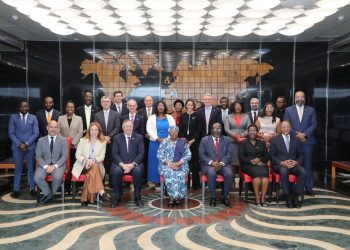
By Ekkehard Friedrich
Today Shell wrote down their reserves in PEL39 offshore Namibia by US$ 400m stating that it can currently not be commercially developed.
With inaction to commit to developing adequate onshore support infrastructure, the generally slow administrative pace, uncertain policies, the cost of development of Namibia’s intricate ultra deep offshore fields becomes increasingly prohibitive (which of course decreases the net present value of the reserves and leads to write downs).
Let us be clear – Namibia’s offshore fields are extremely challenging in the first place and there is a very real risk that oil majors will reprioritize to other fields if the enabling environment deteriorates.
By comparison, currently the deepest field globally is operated by Shell’s Turitella FPSO at a depth of 2900m in the Gulf of Mexico. In Namibia we have fields at 3000m with more challenging sea conditions which would make the development of our fields a global first and an engineering marvel. Also bear in mind that the Gulf of Mexico has all the supporting infrastructure in place which reduces the time and cost of development substantially.
If Namibia does not develop adequate onshore infrastructure needed for the next phase of development, this will likely be done from Angola or South Africa which will cost the developers substantially more and will smother any direct local onshore supporting industry development (which will then happen in neighboring countries).
Also note that it is very easy for an oil major to “pull up the wheels” and develop another field and come back in several years, if ever. This has been the case in several other African countries such Senegal.
Not all is doom and gloom though, Namibia is still sitting with a world class resource and many other operators have much “easier” fields to develop from a geological perspective than Shell. Namibia is also one of the best countries to live and work in making it an attractive destination for world class talent to settle down.
Government is trying their best to aid this very new industry limited resources at their disposal and has remained supportive and approachable. Namibians just need to pull together, hold hands with the industry and fix a few simple things to improve the enabling environment to first oil to greatly enhance the chances of it coming off.
Why is it so important for Namibia to get this right? Oil and Gas is one of the few industries that can really move the needle in turning around the fortunes of a country, create prosperity and alleviate poverty (if handled correctly).
Again, putting things into context is useful. Guyana’s economy went from sub-USD1bn to in excess of US$60 billion in just a decade, almost entirely due to developing their offshore oil fields. Namibia’s GDP is US$13 billion currently, GDP could increase 5-fold, just by making this industry work.
Hardly any other industry can do that in such a short amount of time – an opportunity not to be missed by a country with one of the highest GINI coefficients in the world.
*Ekkehard Friedrich is the Managing Partner of Shepherds Tree Investments, a Namibian investment and strategy advisory firm. Shepherds Tree connects international market entrants with Namibian firms and stakeholders and facilitates investments across multiple sectors, with strong roots in the energy, tourism and healthcare sectors. Ekkehard is a former partner at Eos Capital, Namibia’s leading private equity and infrastructure investment firm, and a former Strategy / M&A consultant with Accenture, holds a Masters Degree in Industrial Engineering from Stellenbosch University and is a CFA Charterholder. Questions and comments can be directed to info@shepherdstree.africa







